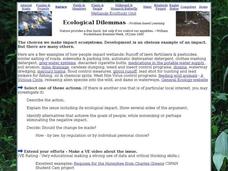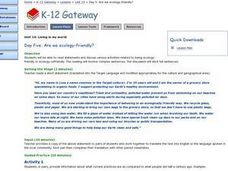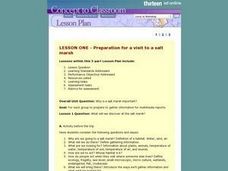Curated OER
Ecological Dilemmas in Wetlands
In this ecological dilemmas in wetlands worksheet, students select a topic, use the links to websites for research, describe the topic, explain its impact on wetlands, identify alternatives and decide on possible changes. An extension...
Curated OER
Creating a Food Web
Students investigate hunters and prey by creating a food web. In this animal life lesson, students investigate a single organism in preparation for a field trip, discovering its diet and habitat. Students each discuss their animal with...
Curated OER
Are We Ecology-Friendly?
Young scholars explore ecology. In this ecology lesson, students read scenarios, discuss them in groups and decide if they are eco-friendly or not. Young scholars discuss the differences in eco-friendly practices fifty years ago and now....
Curated OER
Where in the World? Biomes of the Earth
Learners research a biome. In this biomes of the Earth lesson, students discuss what they already know about ecology and view pictures of different biomes. Learners work in groups to research a different biome. Students use the...
Curated OER
Forest Succession
Students research environmental change and why forests cannot stay the same for long. In this environmental growth lesson, students discuss the life cycle of a tree and examine tree cookies to discover the age of these specimens....
Curated OER
5th grade social studies geography
For this geography worksheet, 5th graders complete multiple choice questions about hemispheres, maps, cities, ecology, and more. Students complete 25 questions.
Curated OER
Ocean Pollution
Students explore ocean pollution. In this ecology lesson, students view a video entitled This Pretty Planet and identify common biodegradable products. Students participate in activities designed to simulate the negative effects of...
Curated OER
Building a Terrarium System
Learners create their own terrariums. In this ecological model lesson, students create terrariums using soil, seeds, pebbles, and two liter bottles. Learners compare the elements of a terrarium to a food web.
Curated OER
How to: Build a Plant Cell
Students build a 3-dimensional model of a plant cell with household objects. In this plant biology lesson, students construct replica plant cells in groups of three. After completing their projects, students share their creations with...
Curated OER
Protecting Our Planet
Students examine the impact of pollution. In this pollution lesson, students watch Protecting Our Planet, then participate in a simulation of the effect of pollution on a variety of organisms.
Curated OER
Trash to Treasures
Young scholars analyze the artwork of Jaune Quick-To-See Smith. In this service project analysis, students create interpretations of their service experience. Young scholars reflect in words utilizing the "I Am" Model. The student rubric...
Curated OER
Earth's Ecology
Learners investigate the three states of water. In this physical science lesson, students watch the video "Earth's Ecology" and observe water in its' three states. Learners record observations.
Curated OER
Paper Bags Made From Trees
In this math and ecology worksheet, students read about the number of paper bags that can be made from a tree. Students fill out a chart in which the number of trees used to make paper bags for a week and a year is calculated for 5...
Curated OER
Understanding Biodiversity Via Ecological Footprints
Sixth graders investigate the ways in which human beings impact the environment and ecology through the calculation of their own ecological footprint, discussion questions pertaining to biodiversity and potential imbalance hazards, and...
Curated OER
Composting Conundrum
Students research cafeteria composting. In this composting lesson plan, students design a vessel that would allow the cafeteria staff to collect food scraps for composting. Then students build a prototype and present it to the class....
Curated OER
"ART ZOO 'Blacks in the Westward Movement', 'What Can You Do with a Portrait', and 'Of Beetles, Worms, and Leaves of Grass'"
Students study black history, examine portraits and portrait making and create their own portraits, and investigate their natural environment. This humanities instructional activity provides a text that can be used to teach lessons in...
Curated OER
Ecology
In this ecology learning exercise, students read information about ecology and the nine ecology subdivisions and answer comprehension questions. Students answer ten questions in this matching and fill in the blank learning exercise.
Curated OER
How Ecosystems Change
In this ecosystems learning exercise, students will look at 4 diagrams and determine if either primary or secondary succession would occur after that particular event happened. Then students will determine the limiting factor for 4...
Curated OER
Environmental Issues
In this environmental issues worksheet, students respond to 14 different types of questions divided into 3 sections. First, they define global warming and give an example of what they can do to slow it. Then, students define 4 terms...
Curated OER
Geography, Ecology, and Folklife
Students identify how do geography and ecology influence a region's folklife. Then they investigate this question and consider how an outsider might view their own region in this lesson. Students also identify how the natural world, even...
Curated OER
Sense of Place
Young scholars identify the major folk regions of Louisiana and the relationship between folklife, geography, and ecology. They give deeper thought to what makes their own community unique, what their sense of place actually is. ...
Curated OER
Beaver Ecology
Students investigate beaver adaptations, life cycle, and the effects of beaver behavior on ecosystems. They compare and contrast how beavers influence the ecology of both forest and aquatic ecosystems.
Curated OER
Why is a salt marsh important?
Middle schoolers discuss the salt marsh. They define the following terms: habitat, water, land and air. Students work in small groups. They are asked why are they going to a salt marsh? Middle schoolers discuss whose habitat is it at...
Curated OER
Scavenger Hunt
Students explore area around schoolyard by participating in scavenger hunt, examine things that live there, such as noxious weeds, develop observation skills by using five senses, and find and identify ten to fifteen local, natural objects.

























